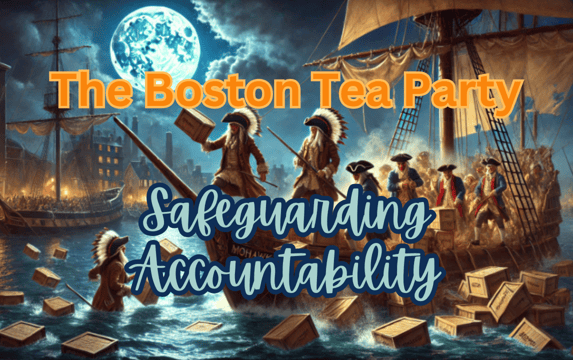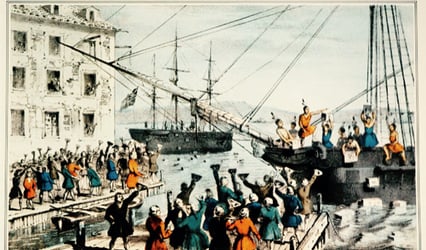The Boston Tea Party: Defiance in the Harbor
On the frosty night of December 16, 1773, a group of American colonists, incensed by British taxation without representation, gathered in Boston Harbor to carry out a bold act of protest. Their target: a shipment of British tea. This act, known as the Boston Tea Party, was far more than a simple tax revolt; it was a pivotal event that galvanized colonial resistance and played a significant role in the lead-up to the American Revolution.
Casey Adams
10/5/20233 min read


Background: The Road to Rebellion
Tensions between the American colonies and Britain had been mounting for years.
The British government had imposed several measures, such as the Sugar Act (1764) and the Stamp Act (1765), which sought to raise revenue from the colonies without their direct consent.
Colonists viewed these acts as violations of their rights as Englishmen, particularly their right to "no taxation without representation."
The Townshend Acts of 1767 further inflamed colonial resentment.
Among other things, these acts placed duties on imported goods, including tea.
Many colonists responded with organized boycotts and protests.
Although Parliament later repealed most of the Townshend duties, it retained the tax on tea as a symbol of its right to tax the colonies.
The Tea Act of 1773 exacerbated tensions by allowing the East India Company to sell tea directly to the colonies, bypassing colonial merchants and reinforcing the unpopular tax.
The Sons of Liberty Take Action
The Sons of Liberty, a group of radical patriots led by figures such as Samuel Adams and John Hancock, saw the Tea Act as another example of British tyranny.
In response, they mobilized public opinion and pressured colonial merchants to refuse the tea shipments.
Three ships carrying East India Company tea—Dartmouth, Eleanor, and Beaver—arrived in Boston Harbor in late November and early December of 1773.
Under colonial law, the ships could not leave until the tea was unloaded and the required duties were paid.
Governor Thomas Hutchinson, a staunch Loyalist, refused to allow the ships to return to Britain without unloading their cargo, creating a crisis.
On the night of December 16, 1773, members of the Sons of Liberty, some disguised as Mohawk Indians to symbolize their rejection of British rule, boarded the three ships.
In an act of organized defiance, they dumped 342 chests of British tea—worth approximately £10,000 (equivalent to millions of dollars today)—into Boston Harbor.
The operation was conducted with discipline; no property other than the tea was damaged, and no participants sought personal gain.
Immediate Repercussions
The British government reacted with outrage. In 1774, Parliament passed the Coercive Acts—known in the colonies as the Intolerable Acts—in direct response to the Boston Tea Party.
These punitive measures included closing Boston Harbor, revoking Massachusetts’ charter, and allowing British officials accused of crimes in the colonies to be tried in England.
The acts further inflamed colonial resistance and led to greater unity among the colonies.
Legacy and Significance
The Boston Tea Party was more than a protest against taxation; it was a bold assertion of American resistance to British rule. It galvanized colonial opposition and set the stage for the Revolutionary War.
The event also demonstrated the power of collective action, inspiring other acts of defiance across the colonies.
By the time the First Continental Congress convened in 1774, the Boston Tea Party had become a symbol of American resistance.
Within two years, open conflict erupted, leading to the American Revolution and the eventual independence of the United States.
The Boston Tea Party remains an enduring symbol of political protest and the fight for self-governance, reminding Americans of their revolutionary heritage and the importance of standing against injustice.
Resources:
This comprehensive article from HISTORY provides facts, summaries, and the significance of the Boston Tea Party. It covers the events leading up to this iconic act of defiance and its impact on American history1.
Digital Public Library of America (DPLA): The Boston Tea Party
Explore primary source sets related to the Boston Tea Party. These include letters, diaries, and newspaper articles that document the causes, consequences, and reactions to this historic event2.
Massachusetts Historical Society: From Tea to Shining Sea
Developed for A.P. United States History and A.P. Economics classes, this resource offers curriculum units. Students can analyze primary source documents to understand the economic, political, and social context leading up to the Boston Tea Party3.
TheHomeSchoolMom: Boston Tea Party Lesson Plans
Access primary sources, discussion topics, activities, and additional resources related to the Boston Tea Party. A great option for teaching this historical event4.
Twinkl: Boston Tea Party Teaching Resources
Curated teaching resources related to the Boston Tea Party. You’ll find a variety of materials suitable for different age groups and learning levels5.
Feel free to explore these resources to enhance your article and provide accurate information about this pivotal moment in American history!



The Boston Tea Party

